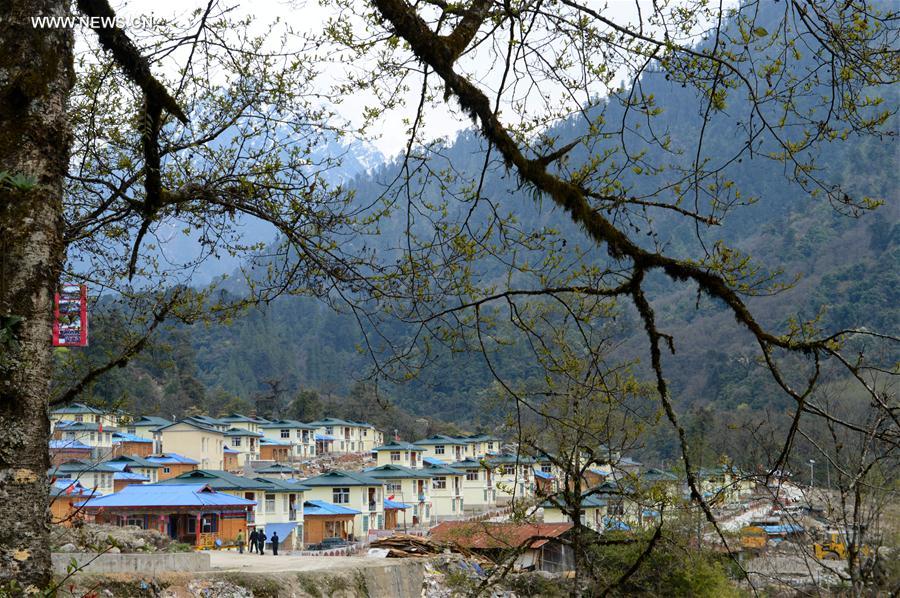


Photo taken on March 20, 2016 shows a village along the Medog Road in Medog County, southwest China's Tibet Autonomous Region. Medog County used to be the last county without a permanent road access in China, due to the landscape being surrounded by several high-elevation mountain ranges. Since its traffic was opened by the Medog Road in 2013, the tourism industry of Medog has witnessed a rapid growth. In 2015, the county received 70,800 trips. (Xinhua/Chen Tianhu)
BEIJING, March 27 -- On March 28, 1959, about 1 million Tibetans broke the chains of serfdom in a historic democratic reform. Fifty-seven years on, the autonomous region once beset by inequality and oppression has witnessed encouragingly fast economic growth and better-than-ever standards of living.
As a documentary that China Central Television (CCTV) aired over the weekend showed, serfs in Tibet were belittled, discriminated against, and treated no better than livestock.
In 1959, a new page was turned. The democratic reform, which centered on abolishing serfdom, was one of the most comprehensive and profound social changes in human history.
Serfs were emancipated, and given the dignity and respect they had long craved. For the first time in centuries, they became masters of their own fate, and their country.
The reform, led by the Communist Party of China, ushered in a new era marked by brightness, progress and prosperity. The potential of former serfs, who were given land and livestock after the reform, was thoroughly unleashed, and change swept through the land.
Over the past 57 years, especially during the 30 plus years of reform and opening up, the people of Tibet, regardless of their ethnic background, have become increasingly aware of the significant role the 1959 reform has played in the history of Tibet.
Generations of Chinese leadership have studied the conditions of the region, formulated forward-looking policies and programs accordingly, and made rapid economic growth, improved living standards and long-lasting social security and stability possible.
If the achievements Tibet has made over the past 57 years prove anything, it is that the 1959 democratic reform was an inevitable choice of Tibetan people and the history, and also what it needed to ensure economic and social development in this region.
Only by remembering the ruthlessness of serfdom and the damage it did over centuries to the vast majority of Tibetans could the historic contribution of the 1959 reform be properly acknowledged.
Only by drawing lessons from history can Tibet continue on the right path and its people work toward a brighter future.
Tibet, now standing at a new historic juncture, is presented with vast opportunities for greater growth.
Day|Week

 Kenyan woman's crappy photoshopped pictures make her a web celebrity
Kenyan woman's crappy photoshopped pictures make her a web celebrity Magnificent view of E. China's Anhui province
Magnificent view of E. China's Anhui province Global landmarks captured in striking shots
Global landmarks captured in striking shots Thailand Elephants Disguised as Pandas Sparks Debates
Thailand Elephants Disguised as Pandas Sparks Debates College girl dresses as mermaid to mark World Water Day
College girl dresses as mermaid to mark World Water Day J-15 fighters in drill on Chinese aircraft carrier
J-15 fighters in drill on Chinese aircraft carrier 96-Year-Old Veteran Becomes Fashion Icon
96-Year-Old Veteran Becomes Fashion Icon Creative mother produces 232 unique breakfasts
Creative mother produces 232 unique breakfasts Charming folk customs in Kalajun Grassland
Charming folk customs in Kalajun Grassland A glimpse of ships and boats commissioned to PLA Navy in past 3 years
A glimpse of ships and boats commissioned to PLA Navy in past 3 years